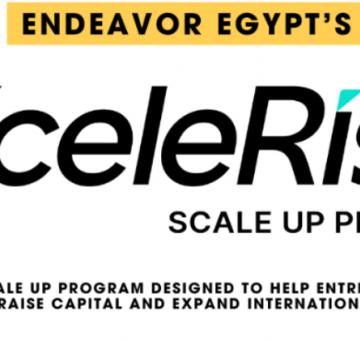What is up with E-commerce in Egypt? Meet 3 E-commerce Startups from TIEC

The e-commerce market is booming worldwide. In fact, in the MENA region, e-commerce sales were estimated to be $34.69 billion in 2019. We have interviewed 3 e-commerce startups, currently incubated at the Technology Innovation & Entrepreneurship Center (TIEC), to understand the sector from their perspectives. We’ve interviewed Mohamed Hedayat, MD of Kemitt, Farah Ahmed, CEO of The Baby Garage and Mostafa Zenhome, CEO of Tawifiqa.
.png)
Mohamed Hedayat, MD of Kemitt
Tell us more about your startup
Kemitt is a platform built for product and furniture designers from all over the globe, offering them the opportunity to sell their unique designs in new markets, risk and hassle-free while Kemitt handles all the manufacturing and shipping processes through local authorized manufacturers.
What is the biggest challenge you face as an e-commerce platform?
According to Hedayat, one of Kemitt’s biggest challenges is customer resistance to online shopping. Some customers still want to see the items and touch the materials before they purchase. To avoid such a challenge, the website has a 14-day refund policy with “no questions asked about the reason of return”. Another challenge is finding a logistics and delivery partner that is reliable and understands the nature and policies of the business. Kemitt had to “explore different delivery companies until finding the best one. In fact, many vendors now put their furniture on Kemitt to avoid the shipping hassle”.
What advice would you give startups starting out in e-commerce?
“Some items are easier to sell online than others. This is why I would advise startups starting out in e-commerce to test the willingness of their customers to purchase their items online”. Hedayat also recommended startups to make sure of the quality their vendors are providing, if they are not selling their own products, as well as always following up with customers after their purchases.
If the startup is still building their platform, they should also make sure their shopping experience is “simple, basic and requires the least possible steps”. Having multiple payment gateway options is also important, for example, Kemitt has partnered up with platforms such as Visa, MasterCard, Fawry and Aman to provide as many payment alternatives as possible for different customers. They also provide installment options. Lastly, Hedayat acknowledged the importance of having purchase guarantees for customers to reduce their online shopping risk.
Your vision for ecommerce in Egypt
Hedayat aspires Egypt to be the MENA region’s “hub for e-commerce” and for online shopping awareness to increase.
Vision for Kemitt
“We aspire Kemitt to be the leading platform in the furniture scene and to expand beyond the MENA region. We also want to leave a positive footprint on society and empower both designers and handcrafters and help them increase their income. Lastly, we want to be the world’s most trusted platform for designers as well as customers”.

Farah Ahmed, CEO of The Baby Garage
What is The Baby Garage (TBG)?
The Baby Garage is a website and mobile app that connects buyers and sellers specialized in children’s products or services. The platform facilitates parents’ shopping experience and allows them to trade pre-owned children’s products.
What is the biggest challenge you face as an e-commerce platform?
According to Ahmed, “finding an effective e-commerce model” is the hardest challenge. The Baby Garage takes a commission from its sellers, therefore the startup needs to balance between providing the best supplier and the most competitive prices. Also, since most models are based on the “volume business”, the startup needs to make sure its model is cost efficient. Another challenge is onboarding the vendors. Each vendor has diverse preferences including different pay out plans and “they are all individual businesses that you as a platform bring them under one umbrella”. This is why TBG works on empowering these vendors and providing programs such as branding and “building a trust base with their customers”.
In addition, the dynamics of the market change rapidly and there is a strong seasonality factor. So according to Ahmed, it is the “survival of the fastest to change”. Startups that pivot according to the market needs are the ones who will grow and survive.
What advice would you give startups starting out in e-commerce?
Ahmed advised startups to “validate their idea before starting out”. For example, TBG initially started as a Facebook page where they built a strong customer base before creating the website. They also test and validate new ideas they come up with before bringing them live. For example, when TBG decided to create a clothes donations initiative, they tested out the idea to make sure that their customers are willing to donate and figured out the method that was most trustworthy. Lastly, the young founder recommended startups to “create a solid streamline of operations with a short duration”.
Your vision ecommerce in Egypt
The e-commerce industry in Egypt is growing and competition is becoming stronger. Therefore startups need to create a “business partnership model” to succeed. They also need to create 360° marketing campaigns for them to stand out.
Vision of The Baby Garage
“We aspire to become the first stop for parents when making their shopping decisions all across the MENA region”. Ahmed also wants the platform to become a “kids shopping advisory center”.

Mostafa Zenhome, CEO of Tawifiqa
What is Tawfiqia?
Tawfiqia.com is a marketplace that aims to lead the digital transformation of automotive products & maintenance market through connecting car owners directly to certified first hand suppliers and service centers. The platform helps this multistep and time-consuming shopping experience to change into a hassle free shopping experience.
What is the biggest challenge you face as an e-commerce platform?
According to Zehoome, “as an e-commerce company specialized in a market that is well known to be random, unorganized and full of fake products, we faced and are still facing a lot of challenges especially on the supply side”. Not all suppliers are ready for this digital transformation era are still unware of how data science can be a magical opportunity for them to improve and scale their businesses. However, this didn’t stop Tawifiqia from working hard and gaining the trust of one supplier to the other. They currently have 40 certified first hand suppliers selling their products on Tawfiqia.com with more than 6000 products uploaded.
What advice would you give startups starting out in e-commerce?
A simple piece of advice Zehoome would give startups that are early in the e-commerce industry is to study their market well and validate their model before launching. Zenhoome also believes that patience is important in this journey, “once you have a strong value on both your supply & demand sides then all you need to do is work hard and be patient”.
Your vision of ecommerce in Egypt
According to Zenhoome, “the need for a convenient and hassle free shopping experience is increasing on the demand side that will facilitate the fast rise up of e-commerce in Egypt.
Vision of Tawfiqia
“Our vision is to be the biggest regional e-commerce company for automotive products and the car maintenance market. We also aspire to be the largest supplier and manufacturers’ online directory where a single person or a business can order directly from manufacturers both locally and internationally”.






































































EgyptInnovate site is not responsible for the content of the comments